|
|
|
Sort Order |
|
|
|
Items / Page
|
|
|
|
|
|
|
| Srl | Item |
| 1 |
ID:
148346
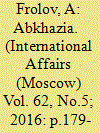

|
|
|
|
|
| Summary/Abstract |
THE COLLAPSE of the socialist world late in the 20th century and the redivision of its territory resulted in the emergence of new independent states, some of which are generally recognized while others are labeled self-proclaimed. But no matter how a new state finds its way onto the map, there will have been deep historical and cultural reasons for its coming into being. One of the new states is Abkhazia.
|
|
|
|
|
|
|
|
|
|
|
|
|
|
|
|
| 2 |
ID:
185339
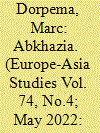

|
|
|
|
|
| Summary/Abstract |
This article seeks to nuance previous conceptions of the 1992 Abkhazian conflict by developing an alternative framework for understanding what is commonly known as ‘ethnic’ war. The resulting ‘non-framework’ conceptualises ethnicity and its mobilisation through a combination of constructivist and instrumentalist readings of ethnicity and nationalism with a radically contingent understanding of events. Creating a novel explanatory vector, this approach questions the nature of generalisable frameworks in themselves, suggesting the case of Tatarstan as a comparative example. To this extent, the model developed here suggests the analytical weakness of ‘ethnic’ war as an overarching category and urges us to treat each case within its own causal matrix.
|
|
|
|
|
|
|
|
|
|
|
|
|
|
|
|
| 3 |
ID:
127486
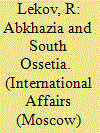

|
|
|
|
|
| Publication |
2013.
|
| Summary/Abstract |
IN TODAY'S DISCUSSIONS on ethno-political conflicts, Abkhazia and South Ossetia are as a rule considered together. Meanwhile, this approach is fraught with too strong a simplification. After all, the two republics, which have broken away from Georgia, have had very different paths to self-determination.
In the Soviet period, Abkhazia was much more poorly integrated into the social, political and cultural space of the Georgian SSR, compared with South Ossetia. Beginning in 1931, the Abkhaz ASSR from time to time witnessed calls for secession from Georgia and the creation of either a separate Union Republic, or for entry into the RSFSR.
|
|
|
|
|
|
|
|
|
|
|
|
|
|
|
|
| 4 |
ID:
097334
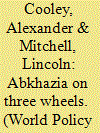

|
|
|
| 5 |
ID:
096352
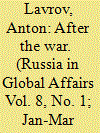

|
|
|
| 6 |
ID:
111139
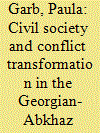

|
|
|
|
|
| Publication |
2012.
|
| Summary/Abstract |
Since the August 2008 war, citizens engaged in Georgian-Abkhaz conflict transformation projects have maintained their resolve to keep open channels of communication across the conflict and continue strengthening fire-proof defenses against violence. These defenses are still fragile, and face challenges from internal and external forces analyzed in this article. This article presents analysis of (1) civil society in Georgian and Abkhaz communities and its role in conflict transformation in the years leading up to the August war of 2008; (2) responses by Georgian and Abkhaz civil society leaders and outside facilitators to events in the months before and during the August war of 2008; and (3) civil society's role in conflict transformation since the August war of 2008 until 2011.
|
|
|
|
|
|
|
|
|
|
|
|
|
|
|
|
| 7 |
ID:
171820
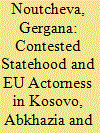

|
|
|
|
|
| Summary/Abstract |
What accounts for the variation in EU actorness in cases of contested statehood in the European Neighbourhood? A comparative analysis of the EU’s policies vis-à-vis three territorial conflicts – Kosovo, Abkhazia and Western Sahara – demonstrates the intricate relationship between external conditions and internal EU capability leading to substantial involvement, partial involvement or non-involvement in conflict management. Using insights from the EU actorness debate and the literatures on contested statehood and EU external governance, the paper offers a conceptualisation of the EU’s conflict management role and a contingent explanation of the EU’s varying commitment to managing conflicts in three cases of contested statehood. The paper finds that external determinants have a considerable weight in EU’s policies which existing research tends to overlook owing to its predominant focus on EU’s internal institutional procedures and instruments. It teases out the external action-enabling and action-hindering factors, in particular the external structural constraints arising from the nature of statehood contestation and the agency of other international and local players in the three conflicts in the European Neighbourhood.
|
|
|
|
|
|
|
|
|
|
|
|
|
|
|
|
| 8 |
ID:
167690


|
|
|
|
|
| Summary/Abstract |
This article seeks to challenge the conception of the Russian state as being centred on Vladimir Putin by looking at the actors implementing Russia’s foreign policy in its near abroad. In particular, it explores the activities of curators (kuratory), a term applied in Russia to describe officials tasked with making things work often bypassing, and sometimes competing with, formal institutions. Following the state transformation framework, the argument put forward in the article is that curation (kuratorstvo), as a practice of coordination and control in Russia’s system of governance, can be seen as a manifestation of fragmentation and internationalisation of Russia’s foreign policy making. The empirical basis for this article is a case study of Russia’s policy towards Abkhazia, which Russia officially recognised as a sovereign state in 2008. This article addresses the involvement of curators in their attempts to exert political influence as an expression of fragmentation as well as emerging institutionalised curation in development assistance as a part of internationalisation.
|
|
|
|
|
|
|
|
|
|
|
|
|
|
|
|
| 9 |
ID:
090424
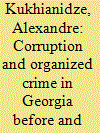

|
|
|
|
|
| Publication |
2009.
|
| Summary/Abstract |
The Soviet collapse in 1991 led to political turmoil, armed conflicts, rampant corruption, and to the growth of organized crime and smuggling in post-Soviet Georgia. Professional criminals called 'kanonieri kurdebi' ('thieves-in-law') captured the state, and criminalization of the government and law-enforcement structures caused a deep political crisis in the country and finally, revolutionary change of the political leadership. Massive arrests of most corrupt government officials, 'thieves-in-law', and other key criminals followed the Rose Revolution in 2003-2005. The new leadership implemented anti-corruption policies and law-enforcement reforms. The crime rate was reduced significantly. Yet, despite anti-corruption reforms, there continue to be repeated accusations of top government officials' involvement in 'elite corruption'. The lack of democracy and threats coming from Russia are the main reasons why Georgia remains a country of high risk, vacillating between stability and turmoil. Turmoil generates corrupt government and provides professional criminals with opportunities.
|
|
|
|
|
|
|
|
|
|
|
|
|
|
|
|
| 10 |
ID:
150548
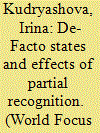

|
|
|
|
|
| Summary/Abstract |
Abkhazia and South Ossetia are the political units which have emerged as de-facto states in the wake of armed ethnical conflicts and were recognized as sovereign states by Russia (2008) and several other countries. Both polities belonged to a periphery of the Russian Empire and then of the USSR, and gained the Soviet experience of stateand nation-building.
|
|
|
|
|
|
|
|
|
|
|
|
|
|
|
|
| 11 |
ID:
123719
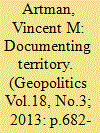

|
|
|
|
|
| Publication |
2013.
|
| Summary/Abstract |
Despite the crucial role it played in the 2008 war between Russia and Georgia, the phenomenon of passportisation has not received a great deal of scholarly attention. Much of the literature has treated the mass distribution of Russian passports to the residents of Abkhazia and South Ossetia as little more than a strategy to manufacture an excuse to go to war with Georgia. Drawing on recent scholarship on territory and territoriality, as well as with literature addressing Agamben's theories of exceptional spaces, this paper contributes to a more nuanced understanding of passportisation by analysing the territorial effects it produced. It argues that the wholesale conversion of Abkhazians and South Ossetians into Russian citizens did not merely manufacture a casus belli, it also produced exceptional spaces within the territory of the Republic of Georgia, where the norms of international law and the modern state system were effectively suspended.
|
|
|
|
|
|
|
|
|
|
|
|
|
|
|
|
| 12 |
ID:
095116
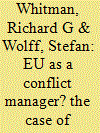

|
|
|
|
|
| Publication |
2010.
|
| Summary/Abstract |
This article offers an analysis of the EU's engagement in Georgia as a standpoint from which to assess the EU's role as a conflict manager. The article begins with a brief narrative account of the development of EU-Georgia relations in the context of the country's two unresolved conflicts over Abkhazia and South Ossetia. It then proceeds to the analysis of two sets of factors-those within, and those external to, the EU-that are crucial for understanding the nature and impact of EU efforts to manage the two Georgian conflicts. On the basis of this case-study analysis, the authors offer a wider analysis of the EU's potential for assuming a wider role as an international security actor. This is undertaken by considering both the limitations of the EU's existing capabilities for conflict resolution and the new developments contained within the Lisbon Treaty. The final part of the article asserts that the EU has suffered from two key weaknesses that have prevented it from living up to its aspirations of becoming a globally significant and effective conflict manager. The first is structural-the lack of, to date, a permanent External Action Service; the second is conceptual-the lack of a coherent and comprehensive conflict management strategy. The article concludes with five substantive principles that should guide the EU's approach to conflict management.
|
|
|
|
|
|
|
|
|
|
|
|
|
|
|
|
| 13 |
ID:
143216
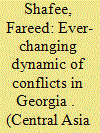

|
|
|
|
|
| Summary/Abstract |
In this article, I will trace the dynamics and changes in internal conflicts in Georgia (Georgian-Ossetian and Georgian-Abkhazian conflicts), and investigate the role of external factors and their interplay with internal factors affecting the dynamic of the conflicts. Mainstream academic literature views the two conflicts as internal. However, after the war in August 2008 that saw visible intervention from Russia, the conflicts, I argue, have turned into intra-state conflict between Georgia and Russia. My further argument is about the decisive role of external factors in the conflicts. The Western and Georgian media tend to emphasize the role of Russia in the conflicts; academic literature is divided over the issue of the influence of external factors. I acknowledge that sometimes Russia’s role is exaggerated and that less attention is paid, particularly in Georgia, to Tbilisi’s wrongdoings. However, overall, the presence and influence of external factors, on at least two occasions, modified the dynamic of the conflicts. Here, along with Russia, other outside players, such as the United States, contributed to the conflicts.
|
|
|
|
|
|
|
|
|
|
|
|
|
|
|
|
| 14 |
ID:
160857
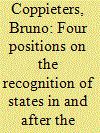

|
|
|
|
|
| Summary/Abstract |
This essay looks at why, how and with what degree of success the international community has applied its recognition policies in the post-Soviet space. The essay addresses the issue from a normative perspective by comparing these policies with alternative policies on recognition that have arisen in Soviet and post-Soviet debates. A basic distinction is made between four normative positions. The essay compares the kind of just cause these positions claim to defend, the motives of those supporting each of these positions, the likelihood of success in achieving the stated objective, and the consequences and drawbacks inherent in each of these positions for post-Soviet conflicts over sovereignty generally and more specifically for the Georgian–Abkhaz dispute.
|
|
|
|
|
|
|
|
|
|
|
|
|
|
|
|
| 15 |
ID:
179200
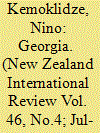

|
|
|
|
|
| Summary/Abstract |
Georgia suffered significant violence during and following the demise of the Soviet Union at the end of 1991. It left Abkhazia and South Ossetia outside the control of the republic, and in 2008, following the Russia-Georgia War, Russia recognised them as independent states, a status acknowledged only by a handful of other states. The Kremlin proclaimed the right of self-determination and secession, but the situation is not straightforward because Georgia has traditionally been multi-ethnic. People have lived side-by side relatively peacefully in Abkhazia and South Ossetia for centuries. The de facto secession poses many dangers of ethnic strife for the future.
|
|
|
|
|
|
|
|
|
|
|
|
|
|
|
|
| 16 |
ID:
134119
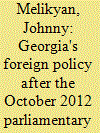

|
|
|
|
|
| Publication |
2014.
|
| Summary/Abstract |
The author looks at the key foreign policy trends and changes that became obvious after the parliamentary elections of October 2012.
The article's first part describes Georgia's foreign policy under President Saakashvili when Georgia received its first conceptual documents-the National Security Concept and the Military Doctrine-both geared toward Europe and the closest possible cooperation with NATO, revised regional relations, and a new agenda.
The second part deals with the changes in Georgia's foreign policy that took place after the presidential elections of 1 October, 2012, when the opposition Georgian Dream Coalition won the majority of seats in the Georgian parliament and the post of prime minister for its leader, Bidzina Ivanishvili. The newly emerging relations between Georgia and Russia and the efforts of the Georgian leaders to resume their dialog with Moscow are also analyzed.
The concluding part offers an overview of Georgia's relations with the European structures, its progress toward an association with the European Union, the course of the talks, and the way this association will affect the main spheres of the country's life.
|
|
|
|
|
|
|
|
|
|
|
|
|
|
|
|
| 17 |
ID:
088629
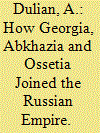

|
|
|
|
|
| Publication |
2009.
|
| Summary/Abstract |
THE AUGUST 2008 EVENTS in the Caucasus and an avalanche of related comments have made it imperative to look back into the past and remind the world of the circumstances under which Georgia, Abkhazia and Ossetia joined the Russian Empire. Archival documents leave no space for doubts: first, back in the 18th to the early 19th century when these states were negotiating their joining Russia they acted as independent separate persons; second, Russia met them halfway when they clearly and insistently asked for protection against the threat of physical extermination or absorption coming from neighboring states. This means that contrary to what is often asserted this was neither occupation nor annexation but an act of brotherly help and manifestation of Russia's clearly understood responsibility for the fates of the neighboring small Orthodox peoples. Here are the facts.
|
|
|
|
|
|
|
|
|
|
|
|
|
|
|
|
| 18 |
ID:
118738
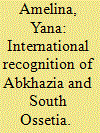

|
|
|
|
|
| Publication |
2012.
|
| Summary/Abstract |
The August 2008 war and recognition, on 26 August, 2008, of the independence of the Republic of Abkhazia and the Republic of South Ossetia by the Russian Federation and, later, by several other countries created a new situation in the Greater Caucasus, which many of the regional and world geopolitical players have found unpalatable. Their active efforts to change the new reality run up against the recognition of independence of these two states, which Russia cannot revoke without losing its international prestige and influence in the Caucasus right up to possible secession of the Northern Caucasus. The above-mentioned players have no choice but to use force to liquidate the republics of South Ossetia and Abkhazia; if this happens, complete and final destabilization of the Caucasus will be inevitable.
|
|
|
|
|
|
|
|
|
|
|
|
|
|
|
|
| 19 |
ID:
089327
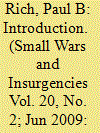

|
|
|
|
|
| Publication |
2009.
|
| Summary/Abstract |
On 8 August 2008 Russian troops invaded Georgia in a short military operation that has led to an effective Russian takeover of the South Ossetia and Abkhazia.The immediate case of the invasion was a dispute over the status of the region of South Ossetia, which up to 1990 had formed an autonomous Georgian Soviet Republic.
|
|
|
|
|
|
|
|
|
|
|
|
|
|
|
|
| 20 |
ID:
093799
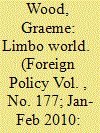

|
|
|
|
|
| Publication |
2010.
|
| Summary/Abstract |
On my recent visit to the Republic of Abkhazia, a country that does not exist, I interviewed the deputy foreign minister,Maxim Gundjia, about the foreign trade his country doesn't have with the real countries that surround it on the Black sea.
|
|
|
|
|
|
|
|
|
|
|
|
|
|
|
|
|
|
|
|
|